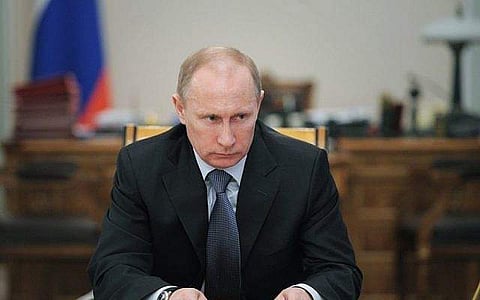

MOSCOW: Spring is not turning out the way Russian President Vladimir Putin might have planned it.
A nationwide vote on April 22 was supposed to finalize sweeping constitutional reforms that would allow him to stay in power until 2036, if he wished.
But after the coronavirus spread in Russia, that plebiscite had to be postponed- an action so abrupt that billboards promoting it already had been erected in Moscow and other big cities.
Now under threat is a pomp-filled celebration of Victory Day on May 9, marking the 1945 defeat of Nazi Germany in World War II.
The holiday has become the most important on Russia's calendar, and this year is the 75th anniversary, with world leaders invited to a celebration highlighting the country's exceptional role in history.
Every year, thousands gather in Moscow, including many elderly veterans proudly wearing their medals.
Military units have already rehearsed the traditional Red Square parade, drilling outside Moscow, and leaders such as France's Emmanuel Macron and India's Narendra Modi had promised to attend.
It would seem impossible to have such a gala now, with much of Russia and the world locked down to stop the spread of the virus.
Kremlin spokesman Dmitry Peskov said last week no decision has been made on whether to postpone it but authorities are considering "options," one of which is to hold it without the veterans, a group especially vulnerable to the virus.
Peskov added the Kremlin would understand if foreign leaders decided not to come due to the pandemic and added the celebration would take place even if it doesn't happen on May 9.
Initially underestimated by Russian authorities, the pandemic has posed an unexpected challenge for Putin, whose political standing now depends on whether he can contain the damage from it.
On March 24, Putin was shown donning a yellow hazmat suit to visit a hospital for infected patients.
Officials then indefinitely postponed the vote on the constitutional reforms that would have allowed Putin to serve two more six-year terms after 2024.
The amendments already have been approved by lawmakers but the government wanted nationwide balloting to give the changes a democratic veneer.
Campaigns promoting the vote had already kicked off in dozens of Russian regions.
In preparation for the vote and Victory Day, Russia's state news agency Tass had begun releasing parts of a three-hour interview with Putin, with the 67-year-old leader talking about what he had done for the country in the past 20 years and what more needs to be accomplished.
But Tass suspended daily extracts of the interview, saying it was no longer relevant to an audience more concerned about the coronavirus.
The outbreak has completely reset the Kremlin's political agenda, said Nikolai Petrov, a senior research fellow in Chatham House's Russia and Eurasia Program.
"Everything that was happening before (the outbreak) has basically been wiped out," Petrov told The Associated Press.
"That whole political agenda (of constitutional reform), that had been unfolding since mid-January is over."
He added that for the moment, "I think we can forget about the constitutional amendments."
The coronavirus crisis presents many difficulties for Putin, whose approval ratings- steadily dropping in the past two years - reached 63% in March - the lowest since 2013.
It comes as the prices of oil, Russia's main source of income, plummeted amid a price war with Saudi Arabia, causing a sharp drop in the ruble.
The pandemic brought with it the prospects of more economic devastation.
As much of Russia went into lockdown, which Putin sugarcoated by describing it as 'nonworking days', many business operations came to a halt, prompting fears of a mass shutdown by companies and leaving millions unemployed.
The Chamber for Trade and Industries, a government-backed business association, predicted 3 million companies could go out of business and 8 million people- almost 11% of Russia's working population-could end up jobless.
A weakening economy and worsening living conditions, widely seen by analysts as the driving force behind Putin's souring ratings, have already become the dominating fear among Russians.
With the crisis still unfolding, it is likely to hurt his standing even more, said Denis Volkov, a sociologist with the independent Levada polling center.
When people start fearing things getting worse 'then the ratings start plummeting." Volkov told the AP.